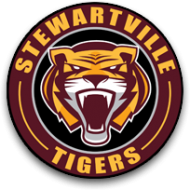Stewartville Public Schools
Science
Curriculum Overview
Kindergarten teachers have developed an in-district science curriculum, which is directly aligned with the Minnesota State Standards. All first through fifth-grade classrooms are using a science curriculum: Science Studies Weekly. The magazine-style format of this consumable curriculum closely aligns with Minnesota State Science Standards and is meant to be taken home on a regular basis and shared with parents.
In 6th grade, the Holt Physical Science curriculum is used to study physical properties, states of matter, mixtures and solutions, motion, energy and heat, force, and waves.
7th Grade Life Science uses the Holt Science and Technology Life Science text. Numerous hands-on activities are used to reinforce learning and concepts in this class. Students learn about the organization of living matter, from atoms to the biosphere. There is a strong emphasis on cell biology, human anatomy, and ecology. Students also cover the periodic table and elements.
In 8th-grade science classes, students learn about the earth’s history and structure, astronomy, climate, the water cycle, weather, and rocks and minerals.
9th-grade Physical Science is designed as an introductory class in chemistry and physics. Topics covered include the scientific method, matter, and its properties, atomic structure, chemical reactions, motion, forces, mechanical energy, electricity, and magnetism. Special emphasis is placed on problem-solving and being able to describe science in everyday life. The textbook for this year-long course is McGraw-Hill Physical Science.
Biology 10 is designed to give students an understanding of the interrelationships of all living things on earth. Topics covered include ecology, cell biology, metabolism, genetics, human anatomy, and plant and animal science. Hands-on labs and activities are an important part of this course, as a means to assist students in learning important concepts and developing thinking and problem-solving skills. McGraw-Hill’s Biology textbook is used.
Chemistry is a concept-intensive course that will greatly assist students in furthering their education at the post-secondary level. It is designed for the general student body and is not as math intensive as Advanced Chemistry. The textbook used is Holt’s Modern Chemistry. Advanced Chemistry is a lab-intensive course designed to prepare students for college science classes. There is a strong emphasis on experimental design, technique, and publication. The Modern Chemistry text is also used in the class.
Physics is a year-long, activity-intensive course designed for advanced students who want to learn about matter, energy, and the various forces that exist in nature. Problem-solving is given high priority, and students spend most of their time working with others on labs and projects. Velocity, acceleration, forces, momentum, work, and energy topics are covered in the first semester. The second semester focuses on electricity, magnetism, astronomy, optics, and sound. Students should be comfortable using algebra and trigonometric functions. The textbook for this class is Physics 7th Edition by Cutnell & Johnson.
Anatomy & Physiology
Anatomy and Physiology focus on the human body. It is an in-depth study of the human body and how it functions from the level of the cell through the tissues, organs, and systems. Labs will be conducted that correlate with the system of the body that is being studied.
College Biology (1091/1092)
This course is two semesters of general biology through Riverland Community College. Topics for the first semester include the scientific method, characteristics of life, biological chemistry, cell, and membrane structure and function, enzymes, metabolism, mitosis, meiosis, genetics, the structure of DNA, and protein synthesis. Topics for the second semester include evolutionary biology, a survey of biological diversity, animal structure and function, plant structure and function, and ecology.
College Chemistry (1201/1202)
This course is two semesters of general inorganic chemistry. The first semester covers atomic Theory, stoichiometry, chemical reactions, thermochemistry, chemical bonding, molecular structure, atomic structure, periodicity, and the gas phase. The second semester includes properties of solutions, kinetics, equilibrium, acids and bases, thermodynamics, and electrochemistry.
College Engineering (1101)
This course is a completely hands-on, project-based introduction to the different fields of engineering. The class is available for all students, not just those who qualify for the concurrent enrollment option. You will learn and practice important skills for makers and engineers – soldering, 3D design and printing, basic CAD and laser cutting/engraving techniques, and the use of tools and skills for project assembly packaging.


